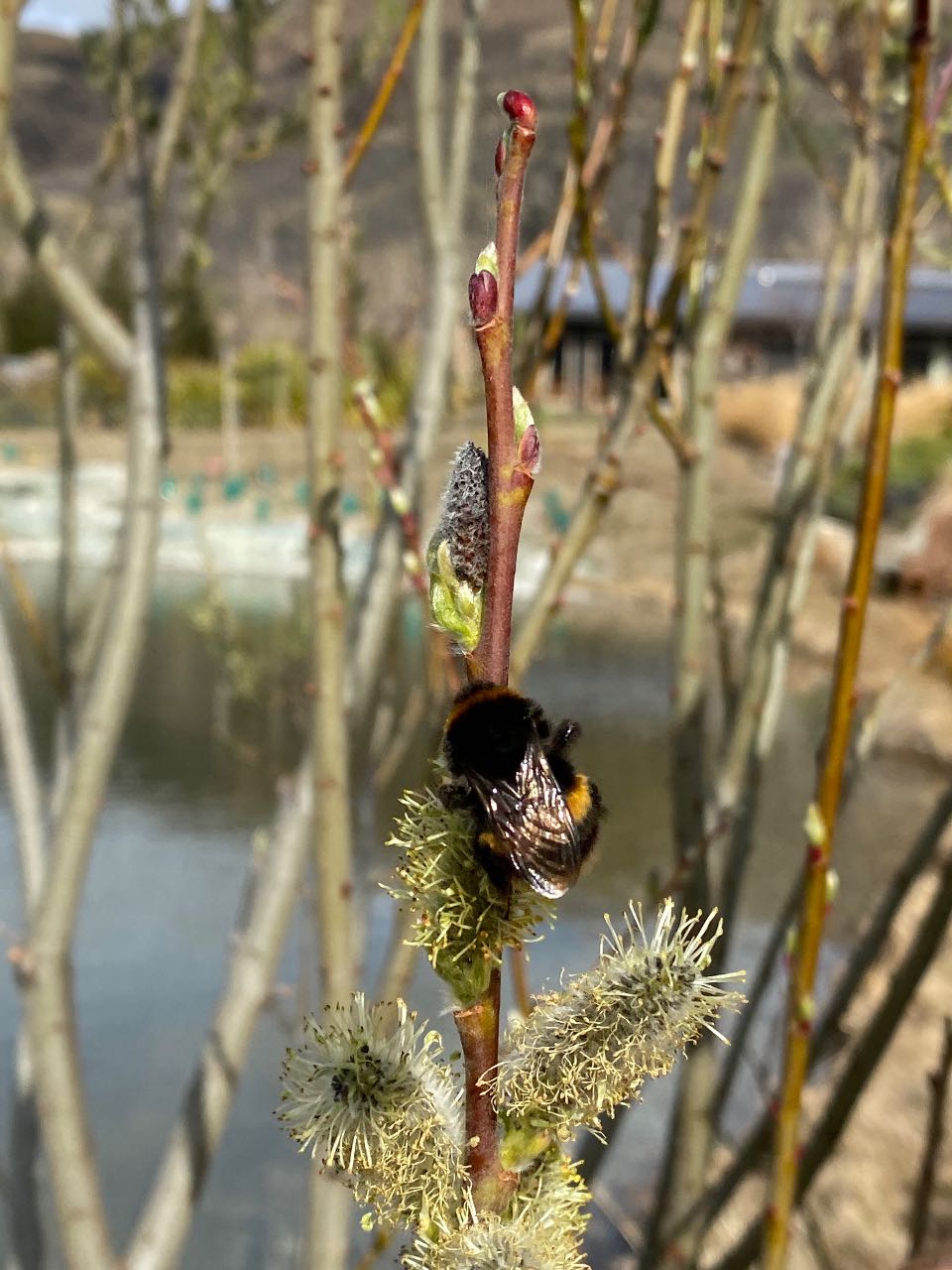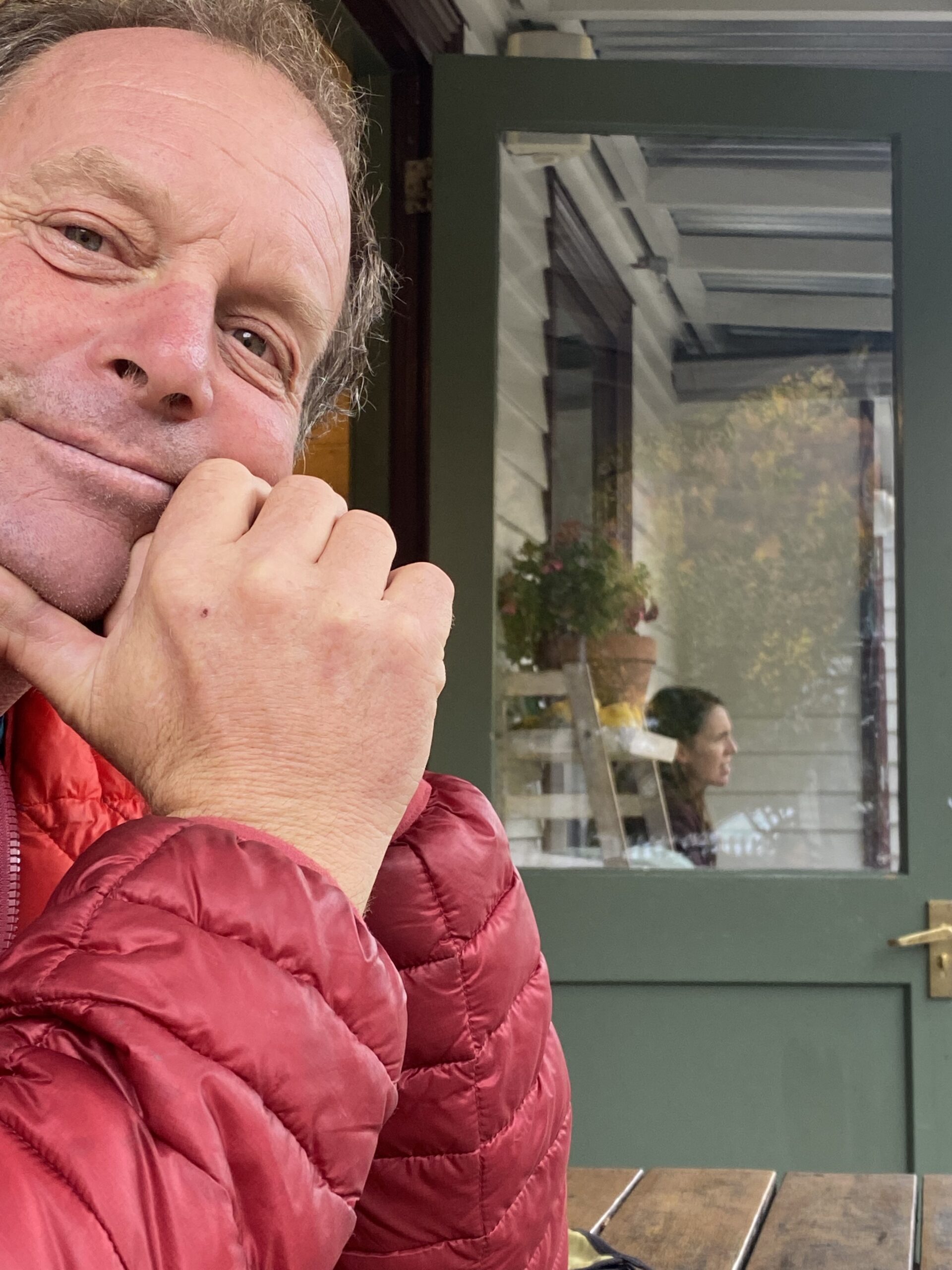This picture has precisely nothing to do with my blog today. I just like the enormous bumblebees that are collecting pollen on the willow beside the pond. If you were trying to get to the house and were allergic to bee stings, maybe you could consider the bumblebee a fact in your way?
I have been writing material for the annual report of one of New Zealand’s science institutions. There have been some particularly interesting nuggets of information; the one that has stood out for me is that provision of facts can sometimes polarise opinions further, rather than leading to agreement. For some of you this may seem obvious, for some of you it may seem ridiculous. However, this is what researchers investigating acceptance of different forms of invasive pest control in New Zealand found. They were interested in what forms of pest control people found acceptable, and particularly what new or developing forms of control might be acceptable e.g. sterility through feeding mRNA or use of gene drives. The researchers found that, rather than wanting a barrage of information, the most successful approach was discussion to reach a consensus. People wanted to feel included and heard, and to trust the people with whom they were interacting.
This finding seems very relevant in a country that is trying to reach a COVID-19 vaccine target (even if that target is as yet unspecified). At present we have increasing numbers of people keen to be vaccinated, combined with high levels of vaccine supply. However, at some point the keen will have been vaccinated and it will be the less keen who remain unvaccinated. And the vaccinated will be very keen for the unkeen to get keener.

The obvious approach to convincing someone to get vaccinated would seem to be to point out the facts to them. Such as, name a potential side effect from vaccination and you will find there is a much higher risk of getting the same condition if you contract COVID-19. Or, vaccination is a key tool to reducing the need for lockdowns, which generally impact negatively on people’s social and financial wellbeing. However, the majority of reluctant vaxxers probably have access to all these facts, and more. If facts were going to change people’s minds, they probably would have already. If the research on pest control measures has any meaning in the vaccination realm, then perhaps completely different approaches are needed for people to whom facts are less important, or who feel overwhelmed by the barrage of facts being pushed at them and between which they cannot decide.
Actually, facts are often less important to all of us than we would like to believe. Do we check every fact that comes our way? Or do we believe some things we are told more than others, depending on the source of the ‘fact’. If we are scientifically trained we believe matters that are in peer reviewed scientific papers a lot more than we believe something we hear in the media. We believe people who have significant track records in an area of knowledge more than we believe people with little track record. However, just yesterday Researcher A told me how Researcher B (who I know well) had significant errors (tens of errors which substantially affected the conclusions they drew) in a published paper which were exposed in another publication. Researcher B simply said, ‘Every paper has a few errors in it’. Peer reviewed scientific papers are not definitive sources of facts.
We tend to believe statements made by people we trust – trust was something that the pest control researchers found was really important in their work. None of this is very new, Aristotle (in the 300s B.C.) determined that persuasion comprises a combination of three appeals: logos (facts), pathos (emotion), and ethos (apparent moral standing). Trust in people is likely to result from a combination of pathos and ethos.
Trust, however, can be as problematic as it is useful. People tend to trust the communities in which they operate. They also tend to want the approval of people in those communities – they want to be seen to be sufficiently similar to those people to remain accepted by the community. So if reluctant vaxxers hang out in a community of reluctant vaxxers (I was struck by the comment of a reluctant vaxxer friend that they know lots of people who don’t plan on getting vaccinated, where I feel like I know very few), then reluctant vaxxers’ positions will get reinforced by the community of those like-minded people. Moreover, getting vaccinated could be seen as a major betrayal by a group, where people are united in being sceptical about vaccinations.
None of these arguments make a difference, however, to the observation that if people aren’t already convinced by facts, they probably aren’t going to be convinced by the next fact, or the next 23 facts, that you can provide them with. They might stop liking you if you keep on providing facts, though. I will have to try to remember that.

Discover more from Jane Shearer
Subscribe to get the latest posts sent to your email.




3 thoughts on “When facts get in the way”
Jane. Good scientists don’t rely on a single paper. They talk about a ‘weight of evidence’. Maybe if the weight of evidence had supported Andrew Wakefield, then you could understand the antivaxxers, but instead they were primed by the media (who love controversy) and who supported what were always very weak and subsequently proven to be incorrect findings in the Lancet MMR paper. The media seem to hate detail and despise things that move slowly (as the weight of evidence usually does)! The media also love to indulge stereotypes (it helps sell copy).
To quote from a ‘Stuff’d” opinion piece today. “Gerrard began in this role in 2018 and is often in the Beehive. Her background is in protein biochemistry but as a professor at the University of Auckland she also possesses a skill not always present in scientists – a clear ability to explain complex topics well.”
Note the indulgence of scientists are poor communicators stereotype. Please don’t tell Baker, Wiles, Dickenson, Hendy, Skegg, Jackson, etc. They might think they have influence! 🙂
Thanks for commenting John. The weight of evidence is an interesting feature of science. On the one hand it is good because it slows down the process such that new ideas are properly considered rather than being thrown out like handfuls of jellybeans (my view of media stories :). On the other hand, the weight of evidence means that new ideas which are valid can struggle to gain acceptance for a long time. There are interesting stories currently out there about the push-back against Katalin Kariko in her mRNA research. There are many, many similar examples of people’s research not being accepted for a long period when it contradicts current paradigms.
The MMR-autism debacle was indeed a really unfortunate series of events, fuelled by media action. It seems to be about equally hard to pull back from something that is incorrect to advance something highly novel that is correct. And yes the media does, damagingly, reinforce stereotypes. Such as of scientists in lab coats who can’t communicate. One could as legitimately say that media can’t intelligently question and research as that scientists can’t communicate!